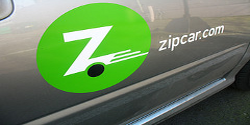In the Club
Internet technology influences our lives in unexpected ways, as Wendy Grossman finds out to her surprise.

Image: CC BY-NC-ND 2.0@Rakka
Sometime around noon on October 8, 2011 I will no longer be a car owner. This is no small thing: like many Americans I started dreaming about my own car when I was 13 and got my license at 16. I have owned a car almost continuously since January 1975. What makes this a suitable topic for net.wars is that without the Internet it wouldn't have happened.
Since 1995, online retailing has progressively removed the need to drive to shops. By now, almost everything I buy is either within a few minutes' walk or online. I can no longer remember the last time I was in a physical supermarket in the UK.
The advent in 2005 of London's technology-reliant congestion charge (number plate recognition, Internet payment) meant a load of Londoners found it convenient to take advantage of the free parking in my area. I don't know what goes on in the heads of people who resent looking down their formerly empty street and seeing some strange cars parked for the day, but they promptly demanded controlled parking zones, even on my street, where daytime parking has never been an issue but the restaurants clog it up from 7pm to midnight. The CPZ made that worse. Result: escalating paranoia about taking the car anywhere in case I couldn't park when I got back.
But the biggest factor is a viable alternative. Car clubs and car-sharing were newspaper stories for some years until earlier this year, while walking a different route to the tube station, I spotted a parking space marked "CAR CLUB ONLY". It turns out that within a few minutes' walk of my house are five or six Streetcars (merging with Zipcar).
For £60 a year I can rent one of these by the hour, including maintenance, insurance, tax, emergency breakdown service, congestion charge and, most important, its parking space. At £5.25 an hour it will take nearly 100 hours a year to match the base cost of car ownership – insurance, road tax, test, parking, AA membership, before maintenance. (There is no depreciation on a 24-year-old car!)
The viability of car clubs depends on the existence of both the Internet and mobile phone networks. Sharing expensive resources, even cars, is nothing new, but they would have relied on personal connections. The Internet is enabling sharing among strangers: you book via their Web site or mobile phone up to a few minutes before you want the car, and if necessary extend it by sending an SMS.
And so it was that about a month and a half ago it occurred to me that one day soon I would begin presiding over my well-loved car's slow march to scrap metal. How much should you spend on maintaining a car you hardly ever drive? If I sold it now, some other Nissan Prairie-obsessive could love it to death. A month later it passed its MOT for the cost of a replacement light bulb and promptly went up on eBay.
In journalism, they say one is a story, three is a trend. I am the second person on my street to sell their car and join the club in the last two months. The Liberal Democrat council that created the car club spaces can smirk over this: though some residents have complained in the local paper about the loss of parking for the car-owning public, the upshot will be less congestion overall.
The Internet is not going to kill the car industry, but it is going to reshape the pattern of distribution of car ownership among the population. Until now it's been a binary matter: you owned a car or you didn't. Most likely, the car industry will come out about even or a little ahead: some people who would have bought cars won't, some who wouldn't have bought cars will join a club, the clubs themselves will buy cars. City-dwellers have long been a poor market for car sales – lifelong Manhattanites often never learn how to drive – and today's teens are as likely to derive their feelings of freedom and independence from their mobile phones as from a car. The people who should feel threatened are probably local taxi drivers.
Nonetheless, removing the need to own a car to have quick access to one will remove a lot of excess capacity (as airlines would call it). What just-in-time manufacturing has done for companies like Dell and Wal-Mart, just-in-time ownership can now do for consumers: why have streets full of cars just sitting around all day?
To make it work, of course, consumers will have to defy decades of careful marketing designed to make them self-identify with particular brands and models (the car club cars are not beautiful Nissan Prairies but silly silver lozenges). Also, the club must keep its promise to provide a favorable member:car ratio, and the council must continue to allocate parking spaces.
Still, it's all in how you think about it. Membership in Zipcar in one location gives you access to the cars in all the rest. So instead of owning one car, I now have cars all over the world. Is that cool or what?
Tags
Share this article











Comments

Latest Articles
Featured Article
Schmidt Happens

Wendy M. Grossman responds to "loopy" statements made by Google Executive Chairman Eric Schmidt in regards to censorship and encryption.
ORGZine: the Digital Rights magazine written for and by Open Rights Group supporters and engaged experts expressing their personal views
People who have written us are: campaigners, inventors, legal professionals , artists, writers, curators and publishers, technology experts, volunteers, think tanks, MPs, journalists and ORG supporters.






Comments (0)